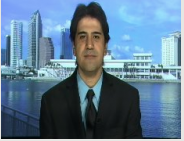Iranian officials' rhetoric and tone on the Yemen crisis has slightly changed some recently for tactical reasons, not strategic ones. This change was initiated because of the shift in Iran's foreign policy regarding how to use "diplomacy" and the appropriate wording in order to achieve Tehran's ideological, geopolitical and economic objectives.
Surprisingly, according to BBC Persian, this week Hossein Amir Abdollahian, the Deputy Foreign Minister for Arab and African Affairs in Iran's Ministry of Foreign Affairs, has offered his country's assistance to other Arab states for "getting out of the crisis in Yemen."
Since the Yemen crisis began and through last week, Iranian officials, including the Supreme Leader Ayatollah Khamenei, and Iranian state-controlled media outlets launched their rhetoric war against other nations, several Arab countries- particularly anti-Saudi rhetoric. They are being criticized for their involvement in Yemen.
What is intriguing about Tehran's attitude is that the Islamic Republic views other countries' engagement in Yemen- even those that share borders with Yemen and have justifiable security reasons to be concerned about the Yemen conflict- as interventions, irrelevant, and intrusive. Simultaneously, Iran sees its role in Yemen as justifiable even though it does not share a border with Yemen and Yemen's conflict does not pose any security threat whatsoever to Tehran.
Iran sees the Yemen conflict as Tehran's struggle to tip the regional balance of power in its favor, promoting its ideological and sectarian values, and demonstrating its regional supremacy over other Arab states in the gulf.
Nevertheless, why is there a sudden diplomatic offer coming from Tehran?
Iranian Leaders Are Biting Off More Than They Can Chew
Iran goes to great lengths to present an image of economic power, however in reality Iranian leaders are hemorrhaging billions of dollars, with the approval of Mr. Khamenei, to maintain their proxies fighting and to keep two other governments in power; in Syria and Iraq.
For many years, the geopolitical, strategic, ideological and economic benefits of creating Shiite proxies across the region exceeded the financial, military and weaponry expenses that Tehran spent on its allies.
The trend has changed for the Islamic Republic. Iran's foreign policies of supporting Shiite proxies and governments led to excesses and unintended consequences. Iran found itself and its proxies and allies fighting in several full-fledged wars and Tehran found itself spending billions of dollars more in its efforts to support its proxies and allies who fought against its strategic rivals.
Iranian leaders are bleeding economically and militarily due to Iran's underlying ideological values, its unintended consequences, and Tehran's foreign policy standards: search for regional preeminence and supremacy, support for proxies, and Tehran's ideological and hegemonic ambitions . What is worse for Tehran is that, this economic and military bleeding (in Syria, Iraq, Yemen, Bahrain, Lebanon, etc.) does not appear to be stopping anytime soon.
As a result, Iran is desperately pleading and manipulating, using words and rhetoric in an attempt to save its budget and military manpower. We should remember that Iran's rhetoric and words worked to solidify the nuclear deal.
But do all of these words mean that Iran is going to actually alter its foreign policy toward Yemen and the Houthis?
Iran's Proxies: Iran Wants to Have their Cake and Eat it Too
Iran's Supreme Leader and the senior cardre of Iran's Revolutionary Guard Corps (IRGC) are so shackled into the underlying ideological and deep-rooted institutional values of the Islamic Republic that they will not, and can not, alter their position of supporting the Houthis.
They also can not retract their support from other Shiite proxies and governments in the region.
Ironically, halting financial, advisory, intelligence, and political support to these proxies and governments could save Iranian leaders billions of dollars. If Tehran lessens its support to those proxies and states, they will be forced to make concessions and consequently the conflict will cease because as long as the Houthis and other proxies believe that the Islamic Republic is behind them, they have no incentive to stop the war.
Hence, Iran will benefit economically if it changes its foreign policies. But the underlying issue is that Tehran is so deeply entrenched in the well-established and instituted ideological, sectarian (Sunni vs Shia), and ethnic (Persians vs Arabs) norms that it is impossible for the government and Iranian leaders to change the character of the state.
Iran's ideological norms which are pervasive throughout the country includes the struggle to tip the regional balance of power against Arab states in the Gulf, which is an indispensable element and pillar of the Islamic Republic, primarily the Supreme Leader and IRGC.
The other reason behind Iran's change of rhetoric is related to Tehran's tactical shift in using verbal manipulation and "diplomacy" in order to achieve its ideological, geopolitical and economic objectives.
After experiencing the success of the nuclear deal, Iranian leaders have learned that smiley faces and wielding a diplomatic tone assisted them in paving the way to receive billions of dollars and have some of the crippling economic sanctions on their country lifted.
In closing, from the Iranian leaders' perspective, a new rhetoric, tactical shift and different choice of words on Yemen might assist them in their attempt to save billions of dollars while simultaneously maintaining Tehran's proxy. As a result Iran could become more empowered in Yemen, and give Tehran a victory in Yemen, all while leaving Iran's underlying foreign policy objectives, ideological principles and regional hegemonic ambitions intact.
Dr. Majid Rafizadeh, an American scholar and political scientist, is the president of the International American Council on the Middle East. Harvard-educated, Rafizadeh serves on the advisory board of Harvard International Review. He is originally from Iran and Syria. You can contact him at Dr.rafizadeh@post.harvard.edu or follow him at @majidrafizadeh
This post first appeared on Al Arabiya.

